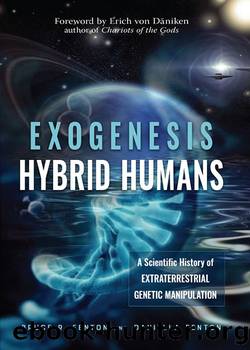Exogenesis Hybrid Humans by Bruce R. Fenton & Daniella Fenton

Author:Bruce R. Fenton & Daniella Fenton
Language: eng
Format: epub
ISBN: 9781632657602
Publisher: New Page Books
CHAPTER 9
WARP DRIVES AND WORMHOLES
If the black hole like Sagittarius A*, located
at the centre of our own galaxy, is large and
rotating, then the outlook for a spacecraft changes
dramatically. That's because the singularity that a
spacecraft would have to contend with is very gentle
and could allow for a very peaceful passage.
âPROFESSOR GAURAV KHANNA, physicist
For extraterrestrial entities to take any role in Earth's prehistory, history, they would require advanced technologies far beyond anything humans possess today, or at least well beyond anything visible to us in public. I can't offer conclusive evidence of how aliens reached Earth, though we can at least explore the feasibility of ancient visitations to our planet based on a look at known and theoretical space travel technologies.
My generation grew up in what has been termed the space age. I was born a year after Viking 1 sent the first images of Mars back to Earth and have lived through a range of subsequent developments, including successful artificial probe missions to all the local planetary systems. Until recently humanity has been limited to rocket technology, which has proven inadequate to allow for direct human exploration of the planets in our solar system. The moon has been our only success story until today.
In just the last couple of years, NASA has been testing a new drive system, known as the EM drive. This has caused a lot of heated debate among physicists, as it seems to break the accepted rules by producing thrust without burning fuel. Some calculations suggest that if the EM drive works as hoped it might take astronauts to Mars in as little as seventy days. The Chinese government claims to already have a working prototype of this propulsion system, and other parties are planning their own tests for this new technology.1
Scientists are also investigating the potential of nuclear thermal and nuclear electric propulsion systems. These could take us to Proxima Centauri (4.24 light-years away) in about one thousand years. Compare this capability to the currently utilized electronic ion drive system, using accelerated ions for thrust, which requires an eighty-one-thousand-year journey to the same star system.
Several theoretical propulsion systems can potentially accelerate our journeys through space, including nuclear pulse propulsion, fusion rockets, fusion ramjet, laser sails, and antimatter engines. Unfortunately, for now, all these systems are hindered by a wide range of technical problems. In some cases, we would need an enormous craft with vast reserves of highly specialized fuel. In others, the construction costs equal more money than ever available or energy beyond the output of the entire planet. That is not to say they might not be feasible in the future as human technology reaches a far higher level.2
Two theoretical technologies sound as if they might be directly linked to Alcheringa's narrative. A description of how the mothership moves might suggest something like an Alcubierre drive: âWe don't move into the gateway, we are suddenly just through it. There is no linear movement as such, we are just instantly there.â3
The Alcubierre drive is close to the warp drive systems portrayed in the television show Star Trek.
Download
This site does not store any files on its server. We only index and link to content provided by other sites. Please contact the content providers to delete copyright contents if any and email us, we'll remove relevant links or contents immediately.
| Ancient & Controversial Knowledge | Ghosts & Hauntings |
| Hermetism & Rosicrucianism | Magic Studies |
| Occultism | Parapsychology |
| Supernatural | UFOs |
| Unexplained Mysteries |
Animal Frequency by Melissa Alvarez(4474)
Sigil Witchery by Laura Tempest Zakroff(4247)
Real Magic by Dean Radin PhD(4129)
Fingerprints of the Gods by Graham Hancock(4005)
Aleister Crowley: The Biography by Tobias Churton(3640)
Journeys Out of the Body by Robert Monroe(3624)
Alchemy and Alchemists by C. J. S. Thompson(3522)
The Rosicrucians by Christopher McIntosh(3521)
Mysteries by Colin Wilson(3456)
Hitler's Monsters by Eric Kurlander(3343)
The Hatha Yoga Pradipika (Translated) by Svatmarama(3343)
Wicca: a guide for the solitary practitioner by Scott Cunningham(3179)
John Dee and the Empire of Angels by Jason Louv(3166)
Infinite Energy Technologies by Finley Eversole(2986)
Book of Life by Deborah Harkness(2939)
Dark Star Rising by Gary Lachman(2868)
The Book of Lies by Aleister Crowley(2847)
Aliens by Jim Al-Khalili(2830)
To Light a Sacred Flame by Silver RavenWolf(2823)
